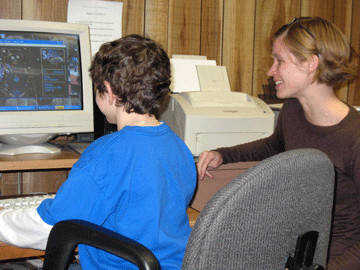CASA seeks volunteers to work with children

Gabrielle Studer spends much of her time working with area youth both inside and outside the classroom.
The 22-year-old local resident, who teaches freshman English at Fort Scott High School, has also spent the last three years working as a volunteer for the Bourbon County Court Appointed Special Advocates (CASA), an agency founded in 1990 that helps abused or neglected children of various ages during juvenile court proceedings, after the child is placed in child protective services. Studer said she has worked eight cases since becoming a volunteer.
Studer, who is originally from Joplin, Mo., said she heard about CASA through an advertisement the organization distributed during a membership drive a few years ago when she first moved to town.
"It worked out perfectly," Studer said. "I like to do community and volunteer work anyway. And I'm not new to working with children."
The local agency is currently searching for about 20 adult volunteers who will spend time with and advocate for a child who becomes involved in the court process as a result of abuse, neglect or divorce. Volunteers typically spend about an hour each week with the child and his or her family, and take on one case at a time. Volunteers also make recommendations to the court concerning the child's best interests.
Volunteers are expected to have good communication skills and a willingness to work with the child and participate in age-appropriate tasks and activities with them. Volunteers must also be trustworthy, Bourbon County CASA Program Director Christa Horn said. Each year, CASA volunteers help several children find safe, permanent homes and the chance for better lives.
Horn said Studer is an example of an ideal volunteer; someone who cares about children and is passionate about influencing their lives.
"She has a real knack for forming relationships and making those connections, and people pay attention to her recommendations," Horn said.
When comparing teaching to volunteering with CASA, Studer said volunteers typically have more freedom to engage and interact with children than teachers do in the classroom.
"There are more restrictions in teaching as far as guidelines," she said. "In CASA, these kids are in tough situations, but to be able to be that constant person in a child's life, that's pretty big."
CASA volunteers are also able to spend more one-on-one time with the child instead of in a group setting, Studer said.
Studer said people who are interested in becoming CASA volunteers should be prepared to spend time working with children in trying to make a difference in the child's life.
"I think to show people that they're valued, that they have worth," she said. "That's the reason why I'm a teacher. Anyone who values children or places a value an importance on children can do this."
Volunteers also collect information before the child's scheduled court date to make sure all issues have been resolved, and work with each child until the case is closed. The volunteer's job is not finished until the judge closes the case, which usually takes about four months.
Studer, a full-time teacher, said the most time she will spend working as a CASA volunteer occurs about every three to six months, when she writes reports on the child's progress and status during his or her case. Studer spends about one evening each week and between three and five hours each month with the child, depending on what stage the case is in. Time spent with each child varies greatly, she said.
Studer said there are many rewards associated with serving as a CASA volunteer.
"I've been able to form some good relationships," she said. "And I still see kids out in the community after their case is dismissed. The rewards are tremendous for the time and effort you put into it."
Horn and Studer said that common misconceptions with many people concerning the CASA program is that volunteers are required to spend too much time with the children, or that volunteering is just too difficult to juggle with a full-time work schedule.
"People can have a full schedule and work full time and still be a volunteer - it's possible," Horn said. "CASA is very flexible."
The CASA program was recently acknowledged for having advocated for 500 children during its existence, Horn said.
For information on becoming a CASA volunteer, contact Horn at (620) 223-2407, or e-mail her at bbcocasa@cpol.net.
